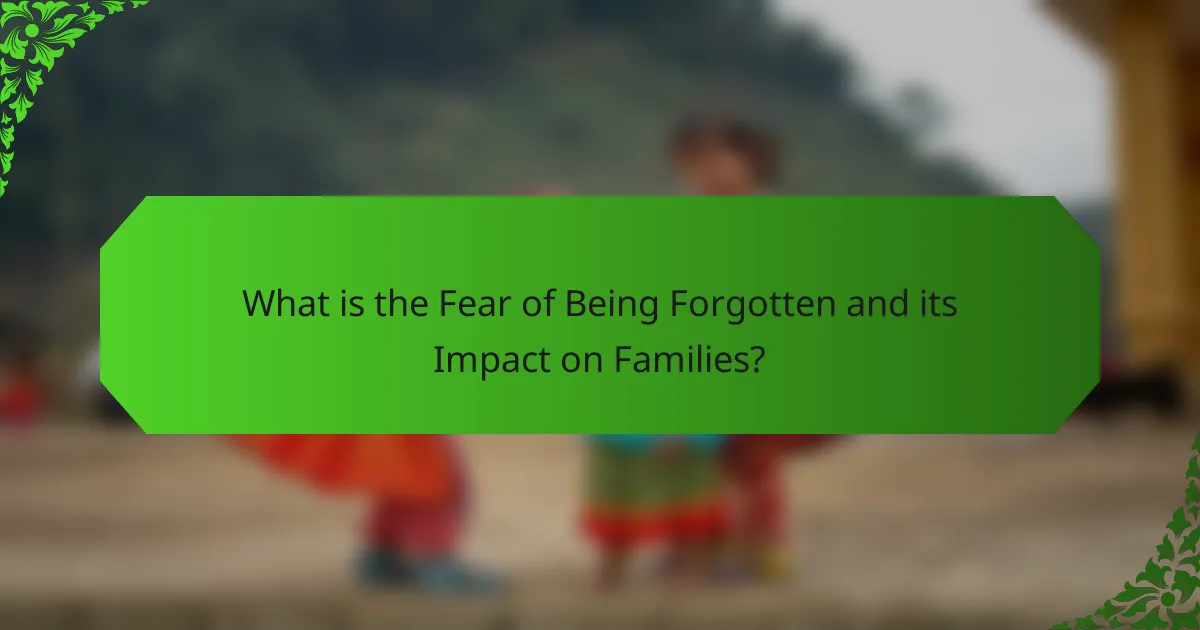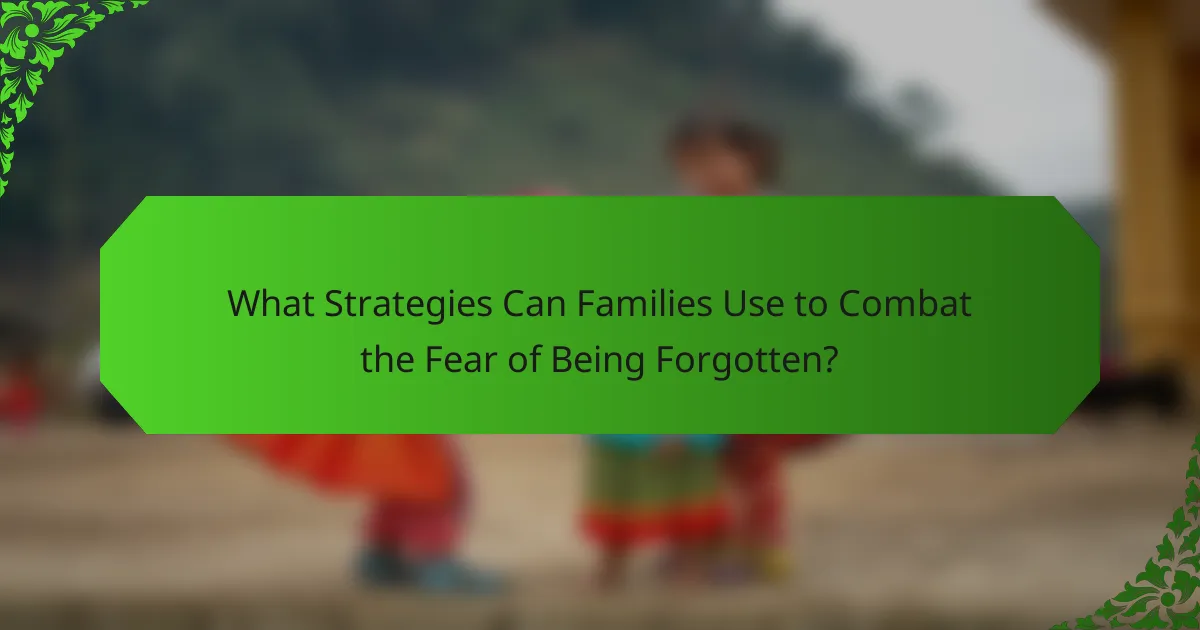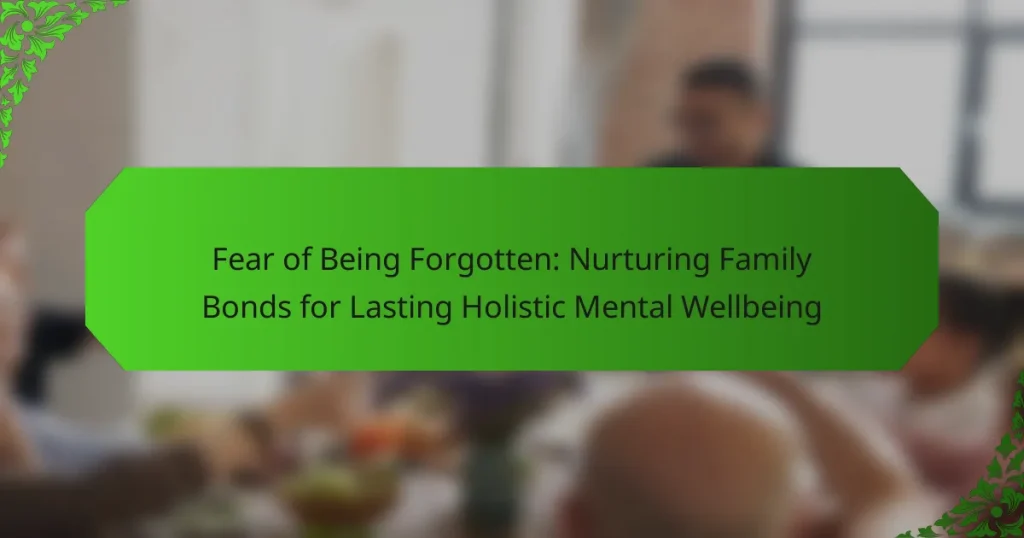The fear of being forgotten can strain family relationships and impact emotional health. This article explores the importance of open communication, shared experiences, and expressing appreciation to nurture family bonds. It highlights how these practices enhance emotional resilience and overall mental wellbeing. By prioritising connection and support, families can combat feelings of isolation and ensure every member feels valued.

What is the Fear of Being Forgotten and its Impact on Families?
The fear of being forgotten deeply affects family dynamics and emotional health. This anxiety can lead to strained relationships, as individuals may feel disconnected or undervalued. Families often face challenges in communication, resulting in diminished support systems.
To nurture family bonds, maintaining open dialogues is essential. Regularly expressing appreciation and sharing memories can strengthen connections. Engaging in activities together fosters unity and combats feelings of isolation.
Research indicates that addressing this fear can enhance overall mental wellbeing. Families that actively work to remember and honour each member’s legacy create a more resilient support network.
In conclusion, recognising and addressing the fear of being forgotten is crucial for sustaining healthy family relationships and promoting holistic mental wellbeing.
How does this fear manifest in family dynamics?
Fear of being forgotten can create tension and anxiety within family dynamics. This fear often leads to behaviours aimed at seeking reassurance and validation from family members. For example, individuals may become overly clingy or dependent, fearing that a lack of attention will result in being forgotten. As a result, family interactions may become strained, with members feeling pressured to provide constant affirmation. This dynamic can hinder open communication and emotional expression, ultimately impacting holistic mental wellbeing. Establishing regular family rituals and open dialogues can help mitigate these fears and strengthen bonds.
What are the psychological effects of feeling forgotten?
Feeling forgotten can lead to anxiety, depression, and a diminished sense of self-worth. These psychological effects stem from a lack of connection and validation, often causing individuals to question their importance in relationships. As a result, fostering family bonds becomes crucial for holistic mental wellbeing. Strengthening these connections can mitigate the fear of being forgotten, enhancing emotional resilience and promoting overall mental health.

What are the Universal Attributes of Holistic Mental Wellbeing?
The universal attributes of holistic mental wellbeing include emotional resilience, social connections, physical health, mindfulness, and purpose. These attributes collectively nurture family bonds, supporting individuals in overcoming the fear of being forgotten. Emotional resilience allows individuals to cope with stress, while strong social connections foster a sense of belonging. Physical health contributes to overall wellbeing, and mindfulness enhances self-awareness. Lastly, having a sense of purpose drives motivation and fulfilment in life.
How does emotional support strengthen family bonds?
Emotional support significantly strengthens family bonds by fostering trust and open communication. This nurturing environment encourages family members to express feelings, share experiences, and provide reassurance. As a result, families develop deeper connections, enhancing overall mental wellbeing. Studies show that families with strong emotional support systems report higher levels of satisfaction and resilience. By prioritising emotional support, families can mitigate the fear of being forgotten, ensuring lasting relationships and a holistic approach to mental health.
What role does communication play in mental wellbeing?
Effective communication fosters strong family bonds, crucial for holistic mental wellbeing. It enhances emotional support, reduces feelings of isolation, and strengthens connections. Open dialogue allows family members to express fears, share experiences, and provide reassurance, mitigating the fear of being forgotten. Research indicates that families with regular communication report higher levels of emotional health. Prioritising communication can significantly improve family dynamics, promoting a supportive environment essential for mental wellbeing.
How can shared experiences enhance family connections?
Shared experiences significantly strengthen family connections by fostering communication and understanding. Engaging in activities together creates shared memories, enhancing emotional bonds. Research shows that families who participate in shared experiences report higher levels of satisfaction and cohesion. Furthermore, these experiences can reduce feelings of isolation and fear of being forgotten, promoting holistic mental wellbeing.

What Unique Attributes Contribute to Lasting Family Bonds?
Strong communication, shared experiences, and emotional support uniquely contribute to lasting family bonds. These attributes foster trust and understanding among family members. Regular family activities enhance connection, promoting a sense of belonging. Additionally, expressing appreciation and affection reinforces these bonds, creating a nurturing environment for holistic mental wellbeing.
How does tradition influence family relationships?
Tradition significantly strengthens family relationships by fostering a sense of belonging and shared identity. It nurtures bonds through rituals, storytelling, and collective memories, enhancing emotional support. Families that engage in traditional practices often experience lower levels of anxiety and depression, contributing to holistic mental wellbeing. For example, regular family gatherings can create a unique attribute of connection, ensuring members feel valued and remembered.
What are the benefits of creating family rituals?
Creating family rituals fosters strong emotional connections and enhances mental wellbeing. These rituals provide a sense of belonging and stability, reducing the fear of being forgotten. They create shared memories, promote communication, and reinforce family identity. Families that engage in regular rituals often experience improved emotional resilience and a deeper understanding of each other. Additionally, these practices can instil values and traditions, nurturing a holistic approach to mental health.

What Rare Attributes Can Deepen Family Connections?
Fostering family connections can be deepened through rare attributes such as shared experiences, emotional vulnerability, and intentional communication. These elements create a strong foundation for lasting bonds. Shared experiences, like family traditions, enhance unity and belonging. Emotional vulnerability encourages openness, allowing family members to express feelings and fears, thus strengthening trust. Intentional communication, including regular check-ins, fosters a sense of importance and reduces the fear of being forgotten. These attributes contribute significantly to holistic mental wellbeing within the family dynamic.
How does vulnerability foster deeper relationships?
Vulnerability fosters deeper relationships by encouraging authentic communication and emotional connection. Sharing fears of being forgotten strengthens family bonds, enhancing mental wellbeing. This openness cultivates trust, allowing individuals to feel valued and understood. As a result, relationships become more resilient and fulfilling.
What is the role of forgiveness in family dynamics?
Forgiveness plays a crucial role in family dynamics by fostering understanding and healing. It nurtures strong family bonds, promoting holistic mental wellbeing. When family members forgive, they reduce resentment, leading to a more supportive environment. This unique attribute of forgiveness enhances emotional resilience, allowing families to navigate conflicts more effectively. As a result, lasting relationships are cultivated, contributing to overall mental health stability.

What Strategies Can Families Use to Combat the Fear of Being Forgotten?
Families can combat the fear of being forgotten by fostering strong connections and open communication. Regular family gatherings strengthen bonds, while sharing memories reinforces a sense of belonging. Engaging in shared activities enhances emotional ties and creates lasting memories. Additionally, expressing appreciation and love frequently can alleviate fears of being forgotten, ensuring every family member feels valued.
How can families effectively communicate their needs?
Effective communication of family needs fosters strong relationships and holistic mental wellbeing. Families can achieve this by practicing active listening, expressing emotions openly, and scheduling regular family meetings. These strategies create a safe space for sharing concerns and desires. Additionally, using “I” statements can help minimise misunderstandings and promote empathy. Engaging in shared activities can further strengthen bonds, enhancing overall family cohesion.
What techniques can be used for open dialogue?
Open dialogue can be fostered through active listening, empathy, and open-ended questions. These techniques promote trust and encourage family members to share their feelings and thoughts. Active listening involves fully concentrating on the speaker, validating their emotions, and responding thoughtfully. Empathy allows individuals to connect on a deeper level by understanding each other’s perspectives. Open-ended questions stimulate discussion and invite more detailed responses, enhancing the overall communication experience.
What activities can families engage in to strengthen bonds?
Families can engage in various activities to strengthen bonds, enhancing overall mental wellbeing. Shared experiences like cooking together foster teamwork and communication. Outdoor activities such as hiking promote physical health while encouraging collaboration. Game nights create opportunities for laughter and connection, reinforcing emotional ties. Volunteering as a family cultivates empathy and shared values, deepening relationships. Regular family meetings provide a platform for open dialogue, addressing concerns and celebrating achievements. These activities nurture a supportive environment, combating the fear of being forgotten.
How can family storytelling enhance connections?
Family storytelling enhances connections by fostering emotional intimacy and shared identity. It creates a safe space for expressing feelings and experiences, which strengthens relationships. Engaging in storytelling can also improve mental wellbeing by reducing anxiety and promoting resilience. Research indicates that families who share stories regularly report higher levels of trust and cohesion. This practice nurtures a sense of belonging, ensuring that family members feel valued and remembered.
What are the best practices for nurturing emotional wellbeing?
To nurture emotional wellbeing and counter the fear of being forgotten, prioritise family connections through regular communication, shared activities, and emotional support. Establishing traditions strengthens bonds, creating lasting memories that enhance holistic mental wellbeing. Engage in open conversations about feelings and experiences to foster deeper understanding and connection. Regular family gatherings, even virtual ones, can reinforce ties and provide a sense of belonging, which is essential for emotional health.

What Common Mistakes Should Families Avoid in Building Bonds?
To build strong family bonds, avoid common mistakes such as neglecting communication, failing to prioritise quality time, and overlooking emotional support. These actions can lead to feelings of disconnection and fear of being forgotten among family members. Regularly engaging in open conversations fosters trust, while shared activities create lasting memories. Prioritising emotional wellbeing ensures that each family member feels valued and connected.
How can neglecting emotional needs harm family relationships?
Neglecting emotional needs can severely damage family relationships by fostering feelings of isolation and resentment. When family members feel unheard or unvalued, trust erodes, leading to communication breakdowns. This emotional neglect can manifest as increased conflict, emotional withdrawal, and ultimately, a disconnection from loved ones. Prioritising emotional wellbeing is essential for nurturing strong family bonds and ensuring lasting holistic mental wellbeing.
What misconceptions about family dynamics should be addressed?
Misconceptions about family dynamics often stem from misunderstandings of emotional needs. Many believe that physical presence alone nurtures bonds, neglecting the importance of emotional connection and communication. Addressing these misconceptions can enhance holistic mental wellbeing. For instance, families may overlook the value of active listening, which fosters deeper understanding and trust. Additionally, the fear of being forgotten can lead to anxiety, emphasising the need for regular expressions of love and appreciation. Recognising these dynamics is crucial for maintaining lasting family relationships.

What Expert Insights Can Guide Families in Nurturing Bonds?
To nurture family bonds and alleviate the fear of being forgotten, families should prioritise open communication and shared experiences. Engaging in regular family activities strengthens connections and fosters a supportive environment. Research shows that families who spend quality time together report higher levels of emotional wellbeing. Establishing traditions can create lasting memories, reinforcing the sense of belonging. Additionally, expressing appreciation and love consistently enhances familial ties, ensuring that each member feels valued and remembered.
What advice do psychologists offer for overcoming feelings of being forgotten?
Psychologists recommend fostering open communication and emotional connections to combat feelings of being forgotten. Engaging in regular family activities strengthens bonds and enhances feelings of belonging. Establishing traditions can create lasting memories, promoting a sense of unity. Additionally, practicing gratitude and expressing appreciation for family members can reinforce connections and mitigate feelings of isolation.
How can families create a culture of appreciation?
Families can create a culture of appreciation by regularly expressing gratitude and recognising each other’s contributions. This practice strengthens bonds and enhances mental wellbeing. Establishing routines, such as family meetings or gratitude journals, encourages open communication about feelings and experiences. As a result, family members feel valued and connected, reducing the fear of being forgotten. Engaging in shared activities that highlight each person’s strengths fosters a supportive environment. Celebrating achievements, both big and small, reinforces positive relationships and nurtures a sense of belonging.



